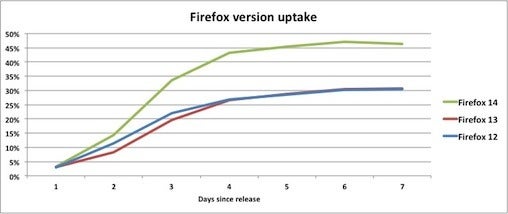 Firefox 14 accounted for nearly half of all copies of the open-source browser in use just a week after its launch, a sign that Mozilla's automatic update mechanism may be working as intended.
Firefox 14 accounted for nearly half of all copies of the open-source browser in use just a week after its launch, a sign that Mozilla's automatic update mechanism may be working as intended.
The browser became the most-used edition much faster than its predecessors, Firefox 12, which launched April 24, and Firefox 13, the version released June 5.
In the seven days since its debut, Firefox 14's share of all Mozilla browsers went from 3% on July 17 to 46% on July 23, according to usage data collected by Irish analytics company StatCounter.
At the end of their first week, version 12 accumulated a 30% share of all Firefox browsers and version 13 accounted for 31%.
Firefox 14 was the second version that Mozilla has shipped since it seeded users with a silent updating service as part of Firefox 12.
Mozilla's silent update service sidesteps Windows User Account Control, or UAC, to push updates into the background so that users receive a browser upgrade without interruption.
 Firefox 14's first-week uptake was significantly faster than either version 12 or 13. (Data: StatCounter)
Firefox 14's first-week uptake was significantly faster than either version 12 or 13. (Data: StatCounter)
Data analyzed by Computerworld four weeks ago showed that Firefox 13, the first after the introduction of silent updating, had, in fact, been adopted at a slower pace than Firefox 12. Mozilla had speculated, and StatCounter's data hinted as much, that an emergency update issued partway through the Firefox 13 upgrade cycle had hindered uptake.
At the time, Mozilla said that it had seen similar adoption issues when it had released a so-called "chem spill" patch before.
Chitika, an online advertising network that regularly mines its ad impression data for trends in operating system and browser usage patterns, reported identical results for Firefox 14.
According to Chitika, Firefox 14 accounted for 46% of all copies of Firefox as of late Monday, and was the most popular version of the Mozilla application on the Web, with almost twice the share of Firefox 13.
The faster adoption rate of Firefox 14, however, was not enough to stem the slide of Mozilla's browser. With just eight days remaining in the month, Firefox had a 23.9% share of all browsers, said StatCounter's, a dip of seven-tenths of a percentage point from June's average of 24.6%.
Rivals Chrome and Internet Explorer (IE), meanwhile, held shares of 34% and 31.6%, respectively, through Monday. Chrome's tentative share was 1.2 points higher than in June, while IE's was down seven-tenths of a point.

No comments:
Post a Comment